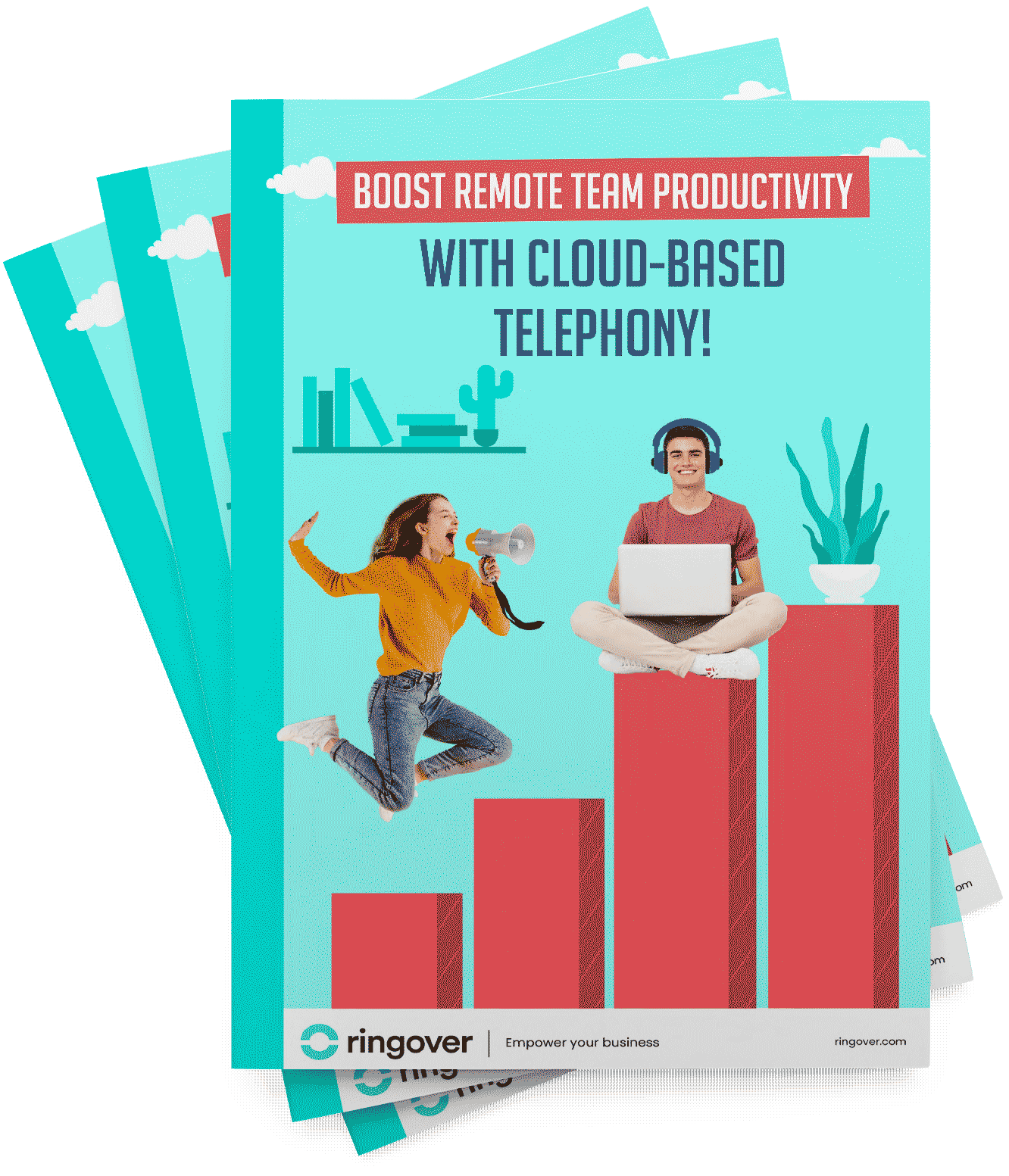Summary
- Table: Top Cloud Telephony Providers
- List: Best Cloud Telephony Services
- 10 Benefits of a Cloud Phone System
- What Is Cloud Telephony?
- How Does Cloud Telephony Work?
- What Is the Difference Between VoIP and Cloud Telephony?
- How Much Does a Cloud Phone System Cost?
- How to Implement a Cloud Telephony Service
- Final Thoughts
- Cloud Telephony FAQ
Cloud telephony, or cloud calling, is a modern technology that changes how businesses handle their phone systems. It's a unified communications service (UCaaS) that operates over the internet, replacing traditional business phone systems.
This article dives deep into cloud telephony's definition, operation, and benefits, showcasing it as a scalable, efficient solution that leverages the internet for comprehensive cloud VoIP services, making it ideal for businesses aiming to enhance their communication capabilities.
Table: Top Cloud Telephony Providers
| Cloud Telephony Provider | Key Features | Best For | Pricing |
|---|---|---|---|
| Ringover | Unlimited calling to 110+ destinations, AI-powered call transcription, large integration library | Businesses of all sizes | Begins at $21 per user/month |
| RingCentral | Omnichannel contact center software, IVR | Large enterprises | Starts at $19.99/user/month |
| Grasshopper | Virtual phone system, call forwarding | Small businesses (less than five people) | Starts at $29/user/month |
| Nextiva | CRM integrations, analytics | Mid-sized businesses | Starts at $23.95/user/month |
| Aircall | Real-time analytics, app integrations | Call centers | Starts at $30/user/month |
| Ooma | Voicemail, video conferencing | Remote teams | Starts at $19.95/user/month |
| GoTo Connect | Toll-free minutes | Large enterprises | $26/user/month |
| Vonage | Text messaging, video conferencing | Businesses that don't mind a complex product offering | $13.99/line/month |
| Dialpad | Call and voicemail transcription, CRM integrations | Contact centers | $15/user/month |
| 8x8 | Unified mobile, desktop, and web app | Scaling businesses | Price on request |
List: Best Cloud Telephony Services
1. Ringover

Ringover is a comprehensive business communication suite with advanced features and a user-friendly interface. With Ringover, you'll easily build your business relationships thanks to top-notch contact center and call center software. Ringover also offers tools suited for recruiting firms who want to establish strong relationships with candidates and clients.
Ringover's VoIP software stands out thanks to unlimited calling to over 110 destinations, omnichannel contact center software including text messaging, social media messaging, WhatsApp, video conferencing, and more, and integrations. The integration library offers popular CRMs like Salesforce, Hubspot, Pipedrive, and ATS like AkkenCloud, Bullhorn, Avionté, and more.
Ringover Pros✅
2. RingCentral
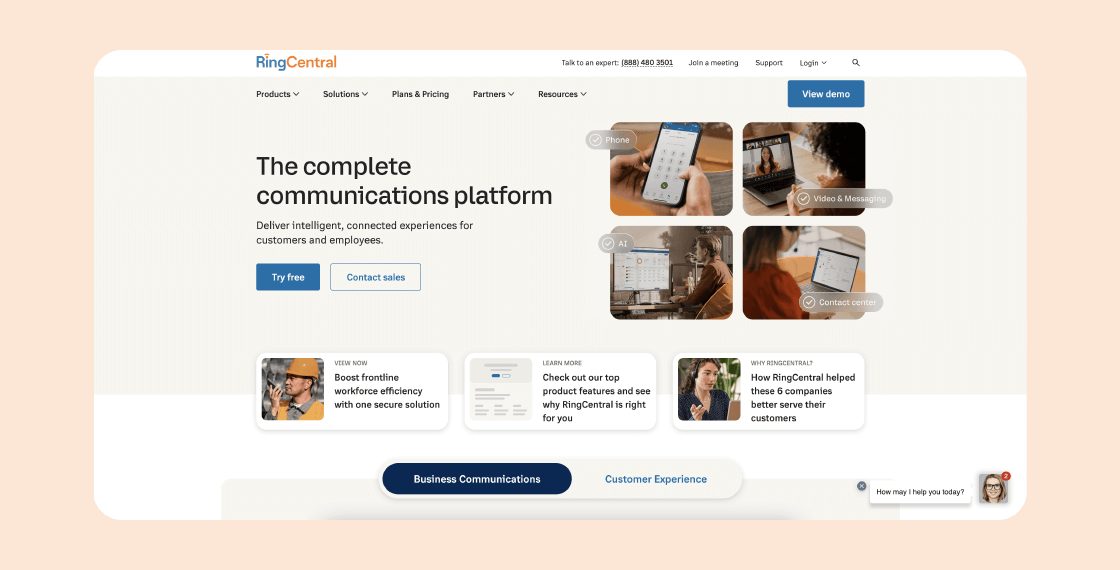
RingCentral sells a cloud PBX which enables businesses to manage customer interactions across multiple channels seamlessly. With features such as IVR, call forwarding, and analytics, RingCentral offers a decent range of capabilities. Its integration capabilities with popular CRMs like Active Campaign mirror those of Ringover, which has a large integration library including HireLogic, TempWorks, and more. However, RingCentral can be overwhelming for smaller teams due to its extensive feature set.
RingCentral Pros✅
- Comprehensive features
- Reliable performance
- Scalable plans
RingCentral Cons❌
- Higher cost for advanced features
- Steep learning curve for new users
3. Grasshopper
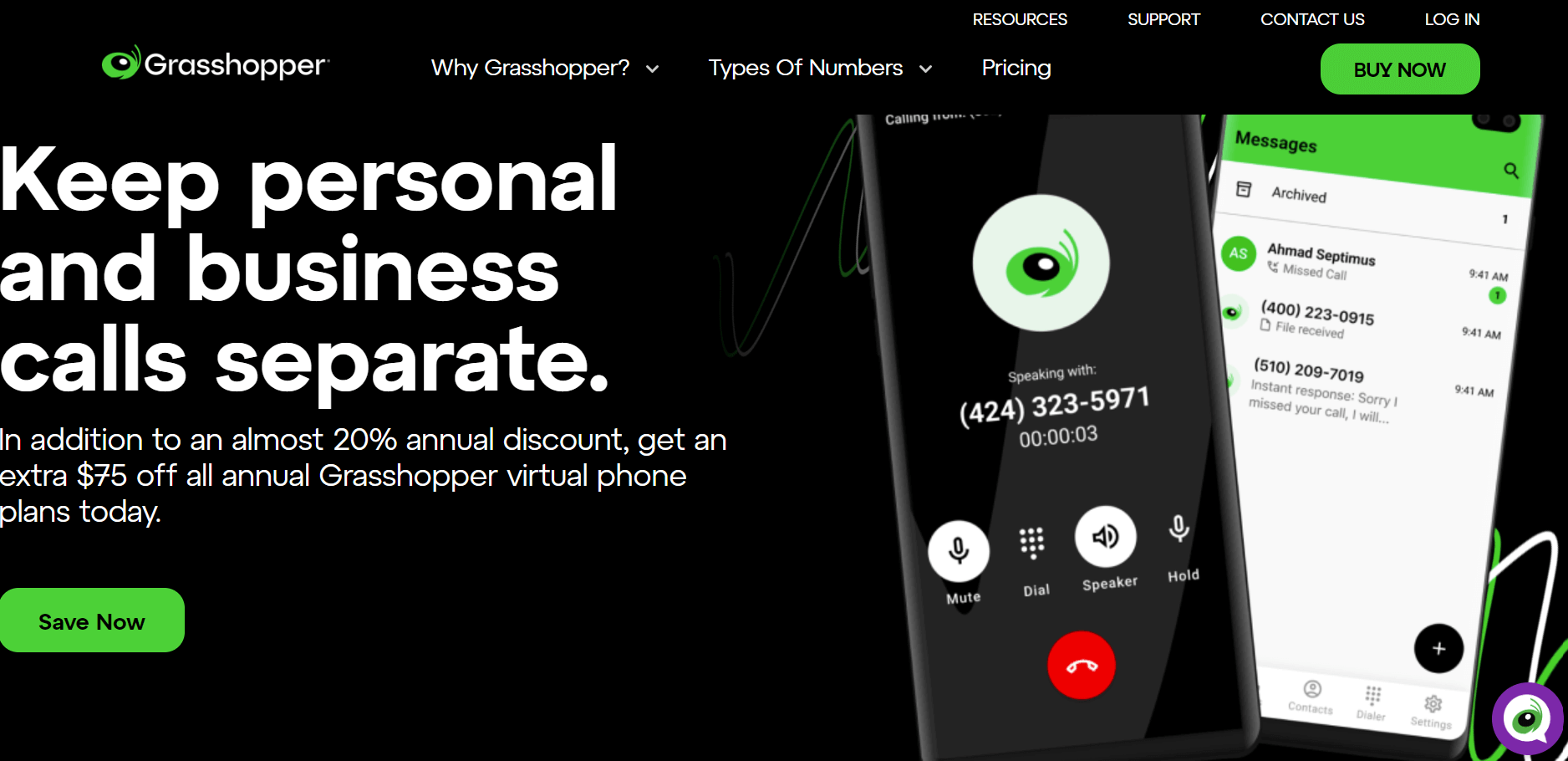
Grasshopper is a virtual phone system designed for small businesses. It offers features like custom greetings, call forwarding, and voicemail transcription. However, the platform is really meant for extremely small businesses and so isn't suitable for businesses that have communication needs.
Grasshopper Pros✅
- Easy setup
- Cost-effective for small teams
Grasshopper Cons❌
- Limited advanced features
- No integrations with third-party tools
4. Nextiva
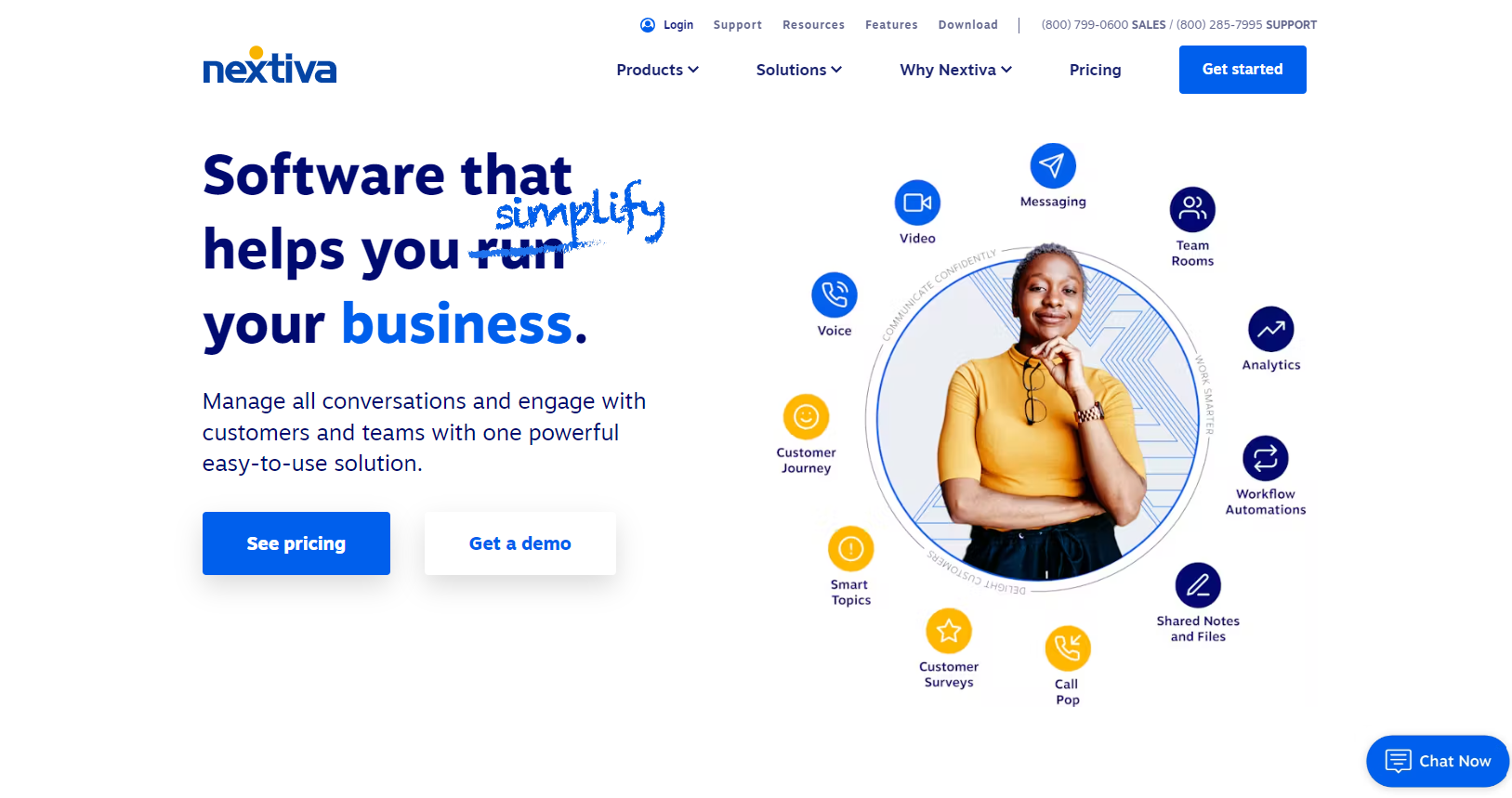
Nextiva is known for its powerful CRM integrations and robust analytics capabilities. It provides businesses with detailed insights into call performance and customer interactions, helping improve decision-making. Nextiva also offers video conferencing and team collaboration tools, making it a versatile option for mid-sized businesses.
Nextiva Pros✅
- Excellent analytics
- Wide range of features
Nextiva Cons❌
- Higher pricing tiers for premium features
5. Aircall
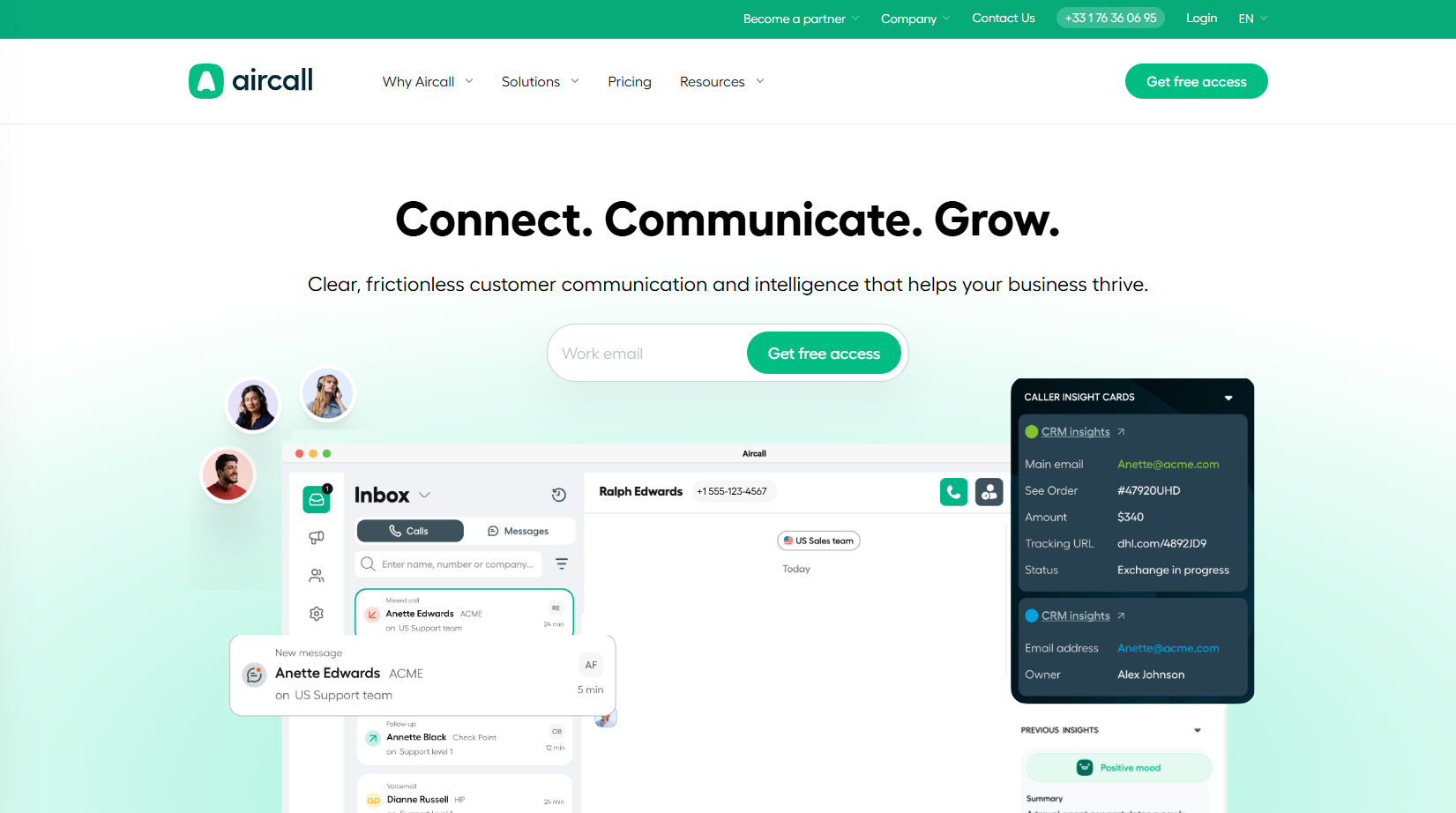
Aircall is a cloud-based phone system tailored for call centers. It offers real-time analytics, call monitoring, and integrations with popular business tools like HubSpot and Zendesk. Aircall has features similar to more reliable customer service-oriented solutions like Ringover, such as call routing and a user-friendly interface.
Aircall Pros✅
- Intuitive interface
- Strong analytics
Aircall Cons❌
- Expensive for small businesses
- Limited offline features
6. Ooma

Ooma is a budget-friendly cloud telephony provider ideal for remote teams. It includes features like voicemail, video conferencing, and call blocking. While it may not have the extensive features of other platforms, Ooma may be sufficient for basic needs.
Ooma Pros✅
- Affordable
- Easy to use
Ooma Cons❌
- Limited advanced features
- Minimal customization options
7. GoTo Connect
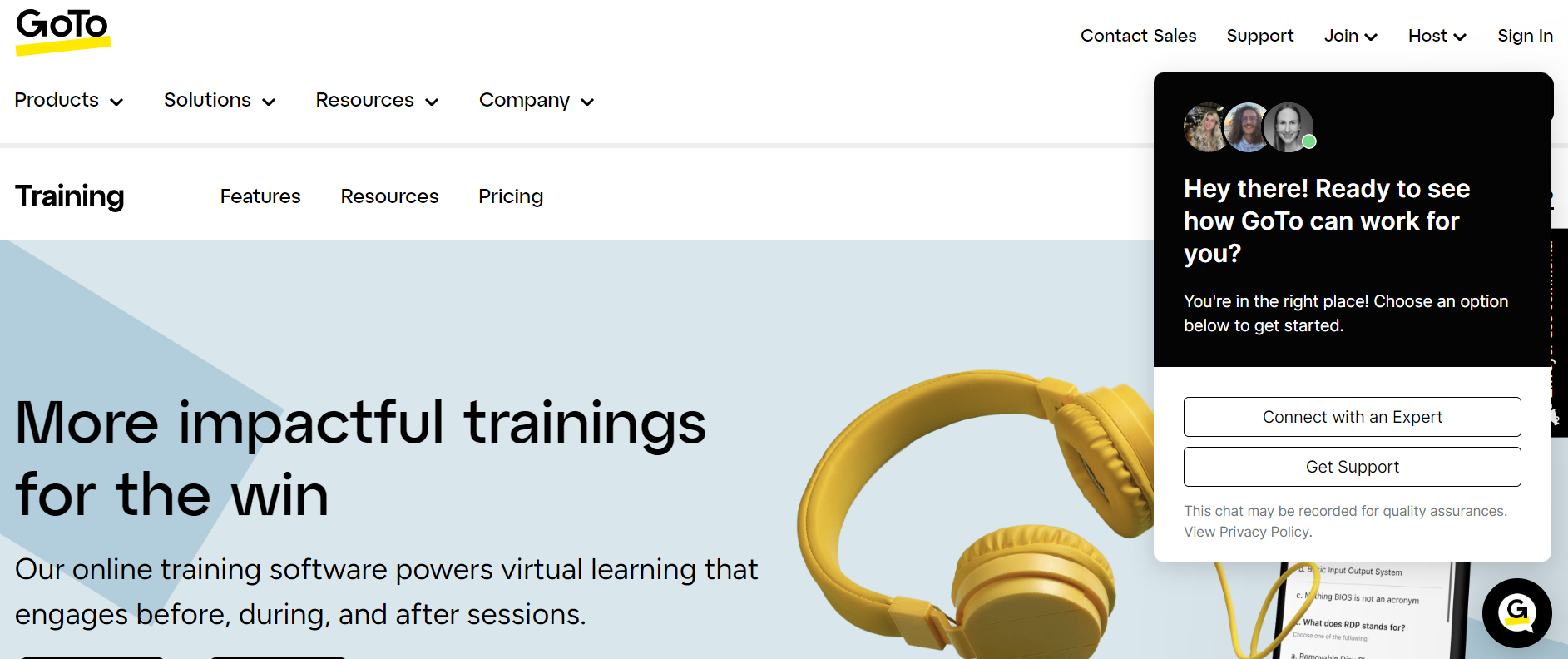
GoTo Connect has features designed to support remote work, though it also offers contact center software. Mainly, this tool manages inbound calls with features like virtual receptionist and spam prevention. Unfortunately, the software has earned a poor reputation for its tech support. Some users note a lack of responsiveness during moments of need.
GoTo Connect Pros✅
- Video conferencing
GoTo Connect Cons❌
- Insufficient support
8. Vonage

One of the most longstanding VoIP software on the market, Vonage has a product range as extensive as it is confusing. Offering UCaaS software, contact center software, and a large variety of communication APIs, Vonage is best-suited for businesses with a robust IT department. Significant support is necessary to understand what products are best for your business and how to integrate them with your existing business solutions like CRMs or ATS.
Vonage Pros✅
- A large selection of features
- History of expertise
Vonage Cons❌
- Some key features are only available as add-ons
- Service quickly becomes very pricey
9. Dialpad

Originally established as a cloud telephony solution, Dialpad has recently transitioned to having a strong focus on artificial intelligence tools. With services like automatic call transcription and summary, Dialpad offers productivity tools similar to other pioneers in AI for customer service like Ringover.
Dialpad Pros✅
- AI tools like call transcription
- AI-powered sales enablement tool similar to Empower by Ringover
Dialpad Cons❌
- Confusing billing
- Lack of customer support
10. 8x8

8x8 is a cloud-based PBX platform which bundles business communication into one software. The features include APIs, call analytics, conference calls, and features associated with contact centers like IVR menus.
Dialpad Pros✅
- Consolidate your business outreach in one place
- Basic features like conference calls and text messages are available
Dialpad Cons❌
- Prices increase quickly as the most affordable plan has a user limit
- Unlimited calls are limited to just a few destinations
10 Benefits of a Cloud Phone System
1. Omnichannel Communications
Cloud telephony integrates voice, text messages, and email into a single omnichannel contact center software, enabling seamless interactions across various channels. This ensures customers can reach your business through their preferred medium, enhancing convenience and satisfaction. For example, Ringover provides an intuitive platform that centralizes all communication channels, making it easier for teams to manage customer interactions efficiently.
Using Ringover, you can reference call logs and call notes to understand the context of each contact's situation, and then reach out in the moment, or schedule messages. With this omnichannel communication approach, you'll reach people on the channel they prefer, at the right time for them.
2. Increased Efficiency & Productivity
By automating call handling and reducing response times, cloud telephony significantly boosts operational efficiency. Features like auto-attendants, speech-to-text, and intelligent call routing streamline processes, freeing up employees to focus on high-value tasks. Ringover excels in this area with advanced automation tools that ensure every call reaches the right person promptly.
3. Scalability
Cloud telephony grows with your business, accommodating increased call volumes or additional users without the need for additional hardware or infrastructure. This adaptability is particularly beneficial for scaling operations during peak periods or business expansion. Ringover offers flexible plans that allow businesses to easily scale up or down based on their specific needs.
4. Cost Savings
Traditional phone systems often come with significant hardware and maintenance costs. Cloud telephony eliminates these expenses by hosting services on the cloud. Additionally, it reduces long-distance and international calling costs. Ringover's transparent pricing structure ensures businesses can enjoy these savings without hidden fees, making it an economical choice for companies of all sizes.
5. Flexibility
With cloud telephony, employees can work from anywhere using internet-connected devices. This flexibility supports remote work and ensures uninterrupted communication, even during unexpected disruptions. Ringover's mobile and desktop apps provide seamless access to business calls and messages, enabling a truly location-independent workforce.
6. Advanced Features
Cloud telephony comes with a suite of advanced tools like IVR, call analytics, and call recording, enhancing the functionality of your communication systems. These features improve call management and provide valuable insights into customer interactions. Ringover's platform includes these advanced features, empowering businesses to deliver better service and optimize performance.
7. Improved Customer Experience
Enhanced responsiveness and personalization are hallmarks of cloud telephony. By leveraging tools like call queuing and CRM integration, businesses can ensure customers are attended to quickly and effectively. Ringover's ability to integrate seamlessly with popular CRMs allows teams to access customer information in real time, leading to more personalized and impactful interactions.
8. Integrations
Cloud telephony connects effortlessly with CRMs, help desks, and other business tools to streamline workflows and improve efficiency. For instance, Ringover integrates with platforms like Salesforce, HubSpot, and Zendesk, enabling teams to manage calls directly from their existing tools and ensuring a unified approach to customer service.
9. Reliability
Cloud telephony systems ensure high uptime and disaster recovery capabilities through cloud backups and redundant systems. This reliability minimizes downtime and ensures consistent communication. Ringover prioritizes reliability with robust infrastructure and 24/7 support, providing businesses with peace of mind.
10. Global Reach
Supporting international calls and managing a global customer base becomes effortless with cloud telephony. Businesses can expand their reach without worrying about the complexities of setting up local phone systems. Ringover provides international numbers and affordable global calling rates, making it an ideal choice for companies with a worldwide presence.
What Is Cloud Telephony?
Cloud telephony, also known as hosted telephony or cloud calling, is a phone system hosted over the internet instead of traditional telephone lines. It allows businesses to manage calls, messages, and other communication functions using cloud-based solutions.
With cloud telephony, companies eliminate the need for physical PBX systems, instead relying on servers maintained by cloud service providers. This setup offers scalability, flexibility, and integration with modern business tools, making it an attractive option for organizations of all sizes. Businesses easily integrate telephony services with CRM tools, ATS, and other platforms to create a seamless communication ecosystem.
How Does Cloud Telephony Work?
Cloud telephony operates through advanced technologies and infrastructure, including VoIP technology, call routing and switching, a stable internet connection, various endpoints and devices, and comprehensive management and control. This setup provides a seamless, scalable, and cost-effective communication solution tailored to any business's needs.
Cloud telephony works by leveraging Voice over Internet Protocol (VoIP) technology to convert voice signals into digital packets. These packets are then transmitted over the internet to their destination. Here's a breakdown of the process:
1. Call Initiation
When a user makes a call, the cloud telephony system captures the input (voice or text) and converts it into a digital format.
2. Data Transmission
The digital signal is transmitted through secure internet connections to the recipient.
3. Call Routing
Cloud telephony systems route the call to the appropriate endpoint—whether it's another phone number, voicemail, or another communication channel.
4. Call Management
Features such as call recording, routing, IVR, and analytics are handled through the cloud platform.
The system is maintained by the service provider, ensuring updates, backups, and security protocols are handled without requiring in-house IT expertise. This makes it an efficient and cost-effective solution for businesses looking to modernize their communication systems.
Deploying a cloud telephony solution gives you access to powerful tools like IVR menus, call campaigns, unlimited calling, and more.
What Is the Difference Between VoIP and Cloud Telephony?
While VoIP and cloud telephony are often used interchangeably, they have distinct differences in infrastructure, functionality, application, scalability, features, and cost structure.
VoIP refers specifically to the technology that enables voice communication over the internet.
Cloud telephony, on the other hand, is a broader term that encompasses a suite of communication tools—including VoIP, text messaging, call management, and analytics—all hosted in the cloud.
Here are the key differences:
- Scope: VoIP is a subset of cloud telephony, focusing solely on voice calls. Cloud telephony includes VoIP along with other services such as text messages, video conferencing, and advanced call routing.
- Management: Cloud telephony is a managed service, where the provider handles updates, maintenance, and scaling. VoIP setups can be managed in-house or by a third-party vendor.
- Features: Cloud telephony offers additional functionalities like IVR, CRM integrations, and omnichannel communication, which are not inherent to basic VoIP services.
How Much Does a Cloud Phone System Cost?
Costs vary, with basic plans starting around $20 per user per month, while premium plans with advanced features can cost $50 or more. Unlike other cloud telephony providers, which may have complex pricing structures, Ringover offers a standardized pricing structure. For example, there are three clearly defined plans with set monthly fees. The Smart plan is $21 per user/month, the business plan is $44 per user/month, and the advanced plan is $54 per user/month.
Providers usually take the following factors into account when setting the price. In some cases, the price can even vary depending on the business needs. However, Ringover keeps it simple with its clearly defined pricing plans.
- Subscription fees
- Features and add-ons
- Installation and setup costs
- Call volume and usage
- Geographic location
- Support and maintenance costs
How to Implement a Cloud Telephony Service
1. Assess Your Needs
Identify your business requirements, such as call volume, integration needs, and desired features.
2. Choose a Provider
Compare providers based on features, pricing, and support to find the best fit for your organization.
3. Plan the Migration
Work with your chosen provider to plan the transition from your existing phone system, ensuring minimal disruption.
4. Train Your Team
Provide training to employees on using the new system effectively.
5. Monitor and Optimize
Use analytics and feedback to continuously improve your setup.
Final Thoughts
In conclusion, cloud telephony is a transformative solution for businesses, offering scalability, flexibility, and significant cost savings. Key benefits include easy setup and integration, the elimination of expensive hardware, scalability, enhanced customer experience, support for remote work, business continuity, global reach, integration with cloud-based tools, and enhanced security. By adopting a cloud telephony solution like Ringover, your teams will level up their productivity and efficiency. If you're curious to see the difference it can make, start your free trial today!
Cloud Telephony FAQ
What is DID in cloud telephony?
Direct Inward Dialing (DID) allows businesses to assign unique phone numbers to individual users or departments within a cloud telephony system.
Which cloud telephony is best?
The best provider depends on your specific needs, which are specific to each business. However, Ringover provides a range of plans with a complete communication suite. The advanced call management features support businesses of all sizes, and there are also various features to support increased productivity. In comparison with other options on the market, Ringover provides a superior selection of services and features for an affordable price.


